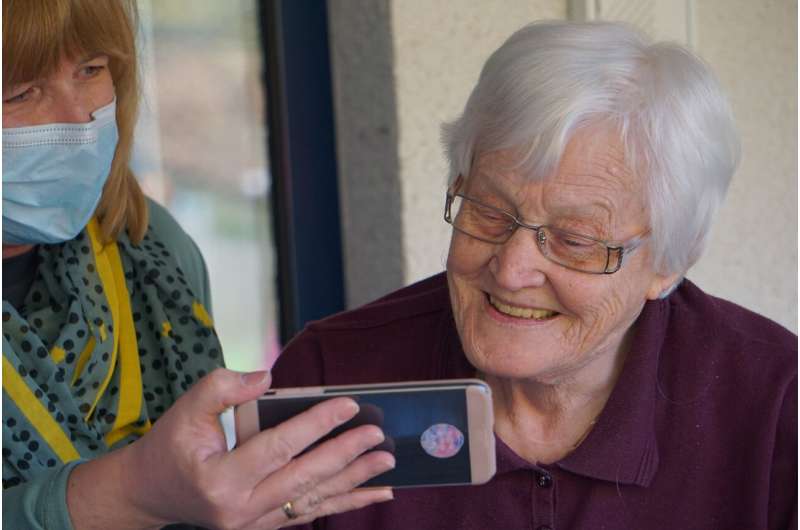This article has been reviewed according to Science X's editorial process and policies. Editors have highlighted the following attributes while ensuring the content's credibility:
fact-checked
peer-reviewed publication
trusted source
proofread
Paging friends and family: Caregivers crucial to in-hospital cardiac arrest survivors

People who provide care for loved ones in the years following a cardiac arrest in the hospital are critical to the survivor's recovery. But while doing so can create a sense of purpose, it also pulls caregivers away from their social networks and disrupts their lives and relationships, new research finds.
A study, published in the Journal of the American Heart Association, highlights the positive and negative ways caregiving changed the lives of caregivers, how people coped with those challenges and their need for additional support and resources.
"There hasn't been a whole lot of focus on caregivers for survivors of in-hospital cardiac arrest," said lead study author Molly Harrod, a health services researcher for the Ann Arbor VA Center for Clinical Management Research in Michigan. "Most research has focused on out-of-hospital cardiac arrest, which is a different kind of trauma."
Only about 9% of U.S. adults who experience an out-of-hospital cardiac arrest survive, according to the latest American Heart Association statistics. But in-hospital cardiac arrest has a survival rate of about 19%. Previous research shows roughly 290,000 adults have cardiac arrests in U.S. hospitals each year.
"For in-hospital cardiac arrest, they're in the hospital for another reason, usually," Harrod said. "When they survive a cardiac arrest, there is still the underlying health issue they were in the hospital for."
For example, someone may be admitted to the hospital for issues related to controlling diabetes, she said, when they suddenly experience cardiac arrest. When they are discharged, they may need care to help recover from the cardiac arrest as well as ongoing care for diabetes.
"All of a sudden, the caregiver has to fulfill a role they were not considering," she said.
In the study, Harrod and her colleagues interviewed 19 veterans who survived an in-hospital cardiac arrest and asked them to identify a friend or family member who was their primary caregiver.
Of the 17 caregivers identified, 12 agreed to be interviewed by phone about their experiences. All were female and nine were spouses of the veterans. Of the remaining three, who did not live with the survivor, one was a parent, one was a sibling, and one was an adult child. Ten of the veterans were men and two were women, with an average age of 62.
Most survivors had in-home professional care when discharged from the hospital. But four to five years later, at the time of the interview, all were still receiving care from a family member or friend. The caregivers performed tasks such as providing transportation, dispensing medication, grocery shopping and cooking, providing emotional support and acting as the survivor's main source of information.
Harrod said most of the experiences the caregivers described fell under the theme of disruption—"how caregiving disrupted their own lives, their relationships with the veterans and also their own well-being."
The people interviewed called caring for the veteran "physically, mentally and emotionally difficult," Harrod said.
Many described withdrawing from their own social activities because they feared their loved one might have another cardiac arrest while they were gone. The care-taking demands sometimes made it difficult to take care of their own needs. Harrod said many described experiencing depression, anxiety and post-traumatic stress disorder.
"This was five years after the cardiac arrest, and they were still struggling with those issues," she said.
But some of the disruption caretakers described was positive. Some "really took pride in being able to do this," Harrod said.
The positive aspects of caregiving don't get enough attention, said Ranak Trivedi, a clinical health psychologist and assistant professor in the department of psychiatry and behavioral sciences at Stanford University in California. "People do it because they care about the people they are taking care of and they often do feel a stronger sense of connection, a sense of purpose and meaning," she said.
Different cultures also have different attitudes about caregiving, said Trivedi, who was not involved in the research. For example, in many Asian cultures, "they don't have the sense of burden as much. There are more positive aspects because they feel like they are carrying out a duty or meeting a need. They feel positive emotions because they are role modeling for the next generation."
Some caregivers found coping strategies to manage the negative aspects of their role, including counseling and stress-relieving activities, such as gardening or prayer, Harrod said. "They were trying to find different ways of coping and were very resourceful in that."
But they also described a need for respite care and support that would give them needed breaks, she said. "They felt comfortable with having a health care provider there so they could go outside the home."
That type of care is typically provided immediately following discharge from the hospital, but not over the long term, Harrod said. "The caregivers felt that if some of that could continue, it would give them a break."
Trivedi said caregivers also need more recognition within the health care system for the role they play.
"They're often not seen as part of a person's health care team, even though they are the experts on how patients get managed day to day," she said. "What we are not doing is treating caregivers as the experts that they are."
More information: Molly Harrod et al, Disrupted Lives: Caregivers' Experiences of In‐Hospital Cardiac Arrest Survivors' Recovery 5 Years Later, Journal of the American Heart Association (2023). DOI: 10.1161/JAHA.122.028746




















